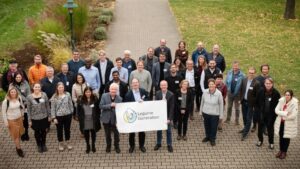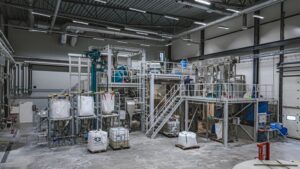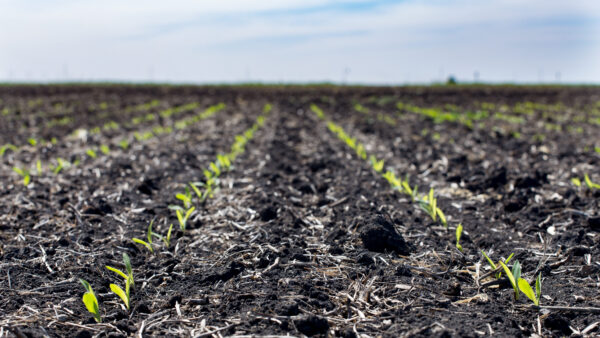Legumes have long been used by farmers as part of crop rotations and other soil-health-building practices because of their unique ability to fix nitrogen.
Legumes, which include crops like soybeans, clover, peanuts and alfalfa, form nodules (specialized plant organs) on their roots, wherein soil bacteria called rhizobia live. In exchange for food and shelter, the rhizobia provides the plant with ammonia-nitrogen, derived from atmospheric nitrogen, which the plant cannot access alone.
In essence, this interaction allows the legume to produce its own nitrogen fertilizer from nitrogen in the air. Legumes also form mutually beneficial relationships with fungi in the soil, which help the plant acquire phosphorus and other nutrients.
“If we can better understand what is happening at the genetic level, we will ultimately be able to improve legumes’ natural abilities to efficiently acquire nutrients,” says Michael Udvardi, Ph.D., chief scientific officer for the Noble Research Institute. “We could also potentially translate this knowledge to other, non-legume plant systems. Imagine if we could improve nutrient uptake in corn and wheat, or make them “fix” their own nitrogen like legumes. That could transform agriculture.”
To conduct this invaluable research in legumes, scientists at the Noble Research Institute, Boyce Thompson Institute (BTI), Clemson University, Texas Woman’s University (TWU), University of Delaware (UD) and University of North Texas (UNT) have collaborated on a project that recently received a four-year, $5 million grant from the National Science Foundation (NSF).
The grant will enable Michael Udvardi, Ph.D., principal investigator, and co-principal investigators, Kiran Mysore, Ph.D. (both with the Noble Research Institute); Catalina Pislariu, Ph.D. (TWU); Darla Sherrier, Ph.D. (UD); Maria Harrison, Ph.D. (BTI); Julia Frugoli, Ph.D. (Clemson) and Rebecca Dickstein, Ph.D. (UNT); to identify and study key plant genes required for important, mutually beneficial relationships between microbes in the soil and the model legume species Medicago truncatula as well as alfalfa, a commercially significant crop.
The researchers are studying genes that are essential for symbiotic nitrogen fixation with rhizobia and for the beneficial interaction with symbiotic fungi. This research, which builds on previous NSF-funded projects, is crucial to sustainable agriculture. The knowledge gained could be applied in ways that would help plants use nutrients like nitrogen and phosphorous more efficiently. This would reduce farmers’ and ranchers’ need for additional fertilizers, which would benefit their operations and the environment.
“We know thousands of genes are involved in these processes, but we don’t yet know what roles most of those genes play or which ones are most important,” Udvardi says. “This grant will enable us to answer these questions and contribute to advancing agriculture and reducing its environmental footprint.”
The grant will also fund outreach activities that engage middle school and high school students as well as adults in science education.












